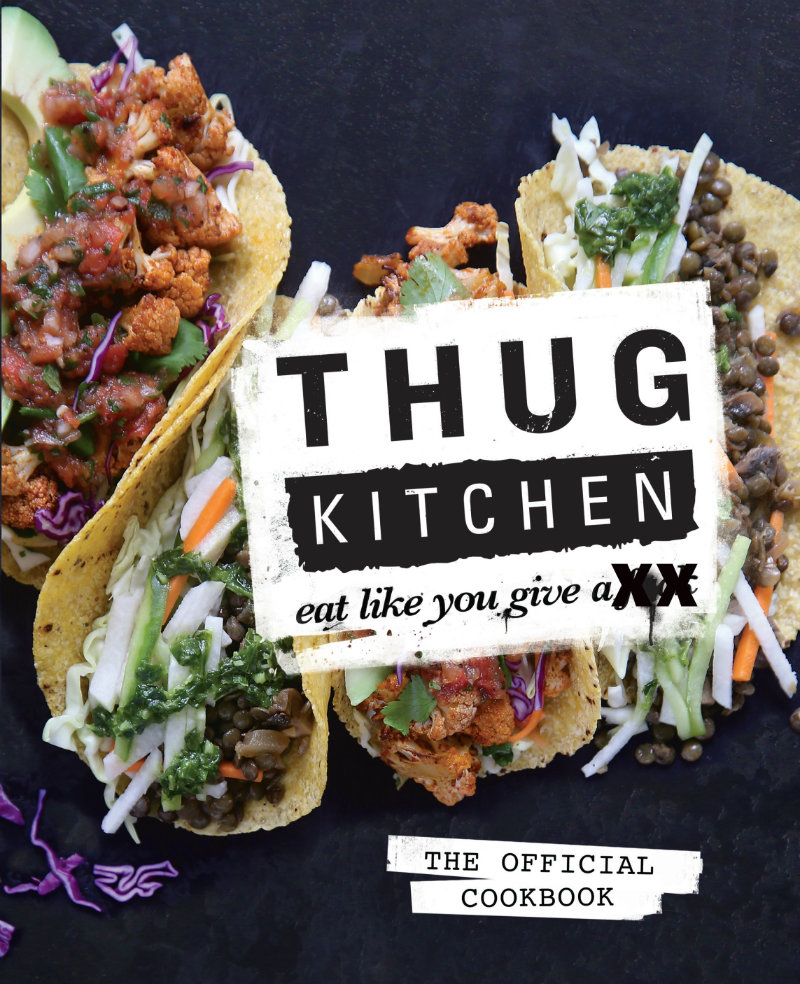Plenty of writers more eloquent than I have weighed in on the Thug Kitchen controversy. If you haven’t been following, here’s a shorthand version: A 20-something white couple in California have been writing an anonymous blog that marries the expletive-filled lingo of urban African American culture with vegan recipes. (The subtitle of the couple’s new cookbook by Rodale gives you an idea: “Eat Like You Give a &^%$.”)
They were unmasked as the publication date neared, and outcries of privilege, appropriation, racism and modern-day blackface hit the Internet. My favorite assessments were from two of my favorite writers on issues of African American food: culinary historian Michael Twitty and cookbook author Bryant Terry. On his blog, Afroculinaria, Twitty wrote, “Thug Kitchen is as much now a part of American cultural history as the early cookbooks that used the language of former slaves to communicate authenticity and entertainment as a stamp of authority.” On CNN.com, Terry wrote, “If Guido’s Kitchen were revealed to be the work not of a blue-collar, East Coast Italian-American, but of an Asian hipster living in the Bay Area, wouldn’t his credibility be shattered?”
Ultimately, he complained of a worse problem: The central joke in Thug Kitchen — the idea of a “thug” browbeating you to make, say, tempeh with arugula — is based on a lie. “Whether or not the hipsters and health nuts charmed by Thug Kitchen realize this, vegetarian, vegan and plant-strong culture in the black experience predates pernicious thug stereotypes,” he wrote.
My own Facebook feed blew up with, among other things, an exchange between one poster who defended her decision to buy their book with the statement, “Thug Kitchen’s recipes were/are simple and easy to make with ingredients that easily adaptable to my picky palate” and another who responded, “If you choose to like something regardless of its origins in racism, oppression and appropriation . . . then you are part of the problem, not part of the solution.”
If any of you consider food a frivolous subject, I’ll give you a moment to reconsider.
To be honest, I hadn’t given all that much thought to the blog, beyond editing an article that included it last year, long before the writers’ identities were revealed. In the midst of the latest controversy, though, I couldn’t wait to page through the review copy of their book after it landed on the pile. As much as I was bothered by all the things that Twitty, Terry and others articulated, I wanted to see whether there was much culinary value behind the gimmick.
This is not a full-fledged cookbook review, because I tested exactly one “Thug” recipe: black bean tortas, the Mexican sandwiches. But boy, did I have trouble with it. A coconut chipotle mayo that was supposed to thicken from the addition of ground chia seeds did no such thing, leaving it the consistency of whipped Thousand Island dressing. I immediately replaced it with a much simpler idea: vegan mayo whisked with a little canned chipotle sauce. The black beans that were supposed to get all creamy and thick to be spooned on the rolls needed a good 20 minutes of cooking, a step that went unmentioned in the book. Without that step, they were soup. I heavily adapted the recipe for publication.
Whether or not you agree that Thug Kitchen’s gimmick is inappropriate and offensive, in the case of the tortas, at least, I think it’s safe to say that the authors might have needed to spend less time thinking up “thuggish” ways of writing recipes and more time making sure they work.
Black Bean Tortas With Chipotle Mayo
6 servings
MAKE AHEAD: The chipotle mayonnaise can be refrigerated for up to 2 weeks. The refried beans can be refrigerated for up to 1 week; reheat before making the tortas.
Just Mayo brand vegan mayonnaise is available at Whole Foods Markets and some other large grocery stores.
Adapted from “Thug Kitchen” (Rodale, 2014).
1/2 cup vegan mayonnaise (preferably Just Mayo brand; may substitute regular mayonnaise)
2 tablespoons sauce from a can of chipotles en adobo, or more as needed (may substitute your favorite chipotle-flavored hot sauce)
1 tablespoon extra-virgin olive oil
1 medium yellow onion, chopped
3 cloves garlic, minced
1 tablespoon ground ancho chili powder
1 teaspoon ground cumin
3 cups cooked or canned no-salt-added black beans (from two 15-ounce cans, drained and rinsed)
1 1/2 cups homemade or no-salt-added vegetable broth (see related recipe)
1/2 teaspoon fine sea salt, or more as needed
1 tablespoon fresh lime juice
6 kaiser rolls, split and toasted
Small romaine lettuce leaves
Flesh of 1 medium avocado, sliced
2 medium tomatoes, cored and sliced
1 small red onion, sliced
Whisk together the mayonnaise and the 2 tablespoons of adobo in a small bowl until smooth. Taste, and add adobo as needed.
Heat the oil in a large, deep skillet or soup pot over medium heat. Once the oil shimmers, add the onion and cook, stirring occasionally, until it starts to turn golden, about 5 minutes. Add the garlic, ancho chili powder and cumin; cook for 30 seconds.
Stir in the beans, broth and the 1/2 teaspoon of salt. Bring the mixture to a boil, then reduce the heat to medium-low so the mixture is barely bubbling. Use a potato masher or large spoon to smash as many of the beans as you can, leaving the mixture chunky. Cook, stirring occasionally, until the mixture becomes very thick, 15 to 20 minutes. Stir in the lime juice, and turn off the heat. Taste, and add salt as needed.
To make the tortas, layer on the bottom halves of the toasted rolls, in the following order: some of the chipotle mayo, the romaine lettuce leaves, a good portion of the beans, the avocado, tomato and red onion. Smear the toasted sides of the top halves with the remaining chipotle mayo. Serve immediately.
Nutrition Per serving: 550 calories, 18 g protein, 69 g carbohydrates, 23 g fat, 3 g saturated fat, 0 mg cholesterol, 680 mg sodium, 12 g dietary fiber, 8 g sugar
Send questions/comments to the editors.



